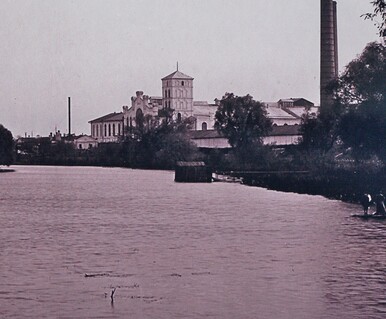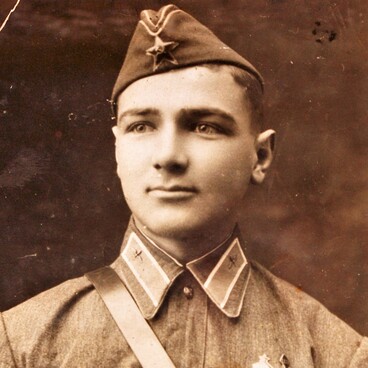Nikifor Voitov was born in 1912, in Pervaya Strelitsa khutor, Bolsheroitsky district, Kursk region. Before the war, he and his wife Nadezhda Luzanova lived in the village of Rzhevka, Shebekino district.
From the first days of the war, Voitov was called up to fight at the front. He served as a shooter in the 853rd Rifle Regiment, 278th Rifle Division, 50th Army of Bryansk Front, and was wounded in 1941, receiving a forearm perforating gunshot wound with an ulnar bone fracture.
After the hospital, Nikifor Voitov was assigned to the Leningrad Military-Political School named after F. Engels located in the town of Shuya. After graduation, he obtained a rank of “junior political instructor”, and returned to the front serving as a political company leader of the 846th Rifle Regiment, the 267th Rifle Division, the 2nd Shock Army.
In 1942, Voitov took part in the Lyuban operation, when the Red Army troops went into the offensive and tried to relieve the siege of Leningrad. At first, the operation developed successfully, but soon the German troops’ counter-attacks followed one after another. The Soviet troops were cut off and surrounded. It became impossible to deliver food and ammunition, medical supplies were depleted, and the daily ration was reduced to one piece of dried bread
Under such severe conditions, the Soviet troops continued to fight. Half a million soldiers died in the Lyuban operation in total, most bodies were never recovered.
In 1942, Voitov’s family also received a death notification. He was considered missing until 2011 when a search party “Gvardiya” discovered the remains of a Soviet soldier near the village of Myasnoy Bor, Novgorod region. A wooden box with a half-decomposed piece of paper laid next to the remains. It was a certificate from the hospital, issued in the name of Nikifor Voitov.
From the first days of the war, Voitov was called up to fight at the front. He served as a shooter in the 853rd Rifle Regiment, 278th Rifle Division, 50th Army of Bryansk Front, and was wounded in 1941, receiving a forearm perforating gunshot wound with an ulnar bone fracture.
After the hospital, Nikifor Voitov was assigned to the Leningrad Military-Political School named after F. Engels located in the town of Shuya. After graduation, he obtained a rank of “junior political instructor”, and returned to the front serving as a political company leader of the 846th Rifle Regiment, the 267th Rifle Division, the 2nd Shock Army.
In 1942, Voitov took part in the Lyuban operation, when the Red Army troops went into the offensive and tried to relieve the siege of Leningrad. At first, the operation developed successfully, but soon the German troops’ counter-attacks followed one after another. The Soviet troops were cut off and surrounded. It became impossible to deliver food and ammunition, medical supplies were depleted, and the daily ration was reduced to one piece of dried bread
Under such severe conditions, the Soviet troops continued to fight. Half a million soldiers died in the Lyuban operation in total, most bodies were never recovered.
In 1942, Voitov’s family also received a death notification. He was considered missing until 2011 when a search party “Gvardiya” discovered the remains of a Soviet soldier near the village of Myasnoy Bor, Novgorod region. A wooden box with a half-decomposed piece of paper laid next to the remains. It was a certificate from the hospital, issued in the name of Nikifor Voitov.

